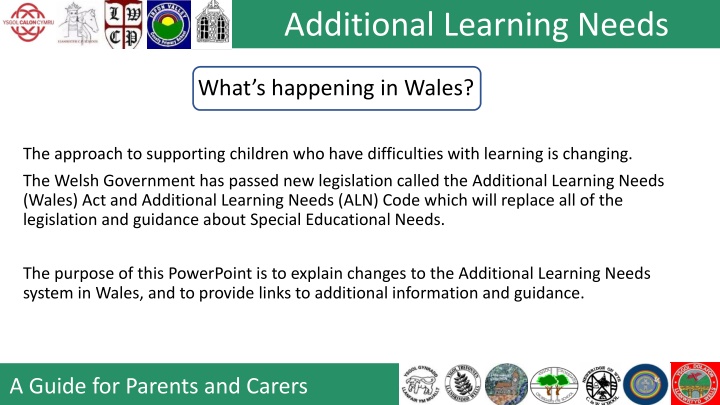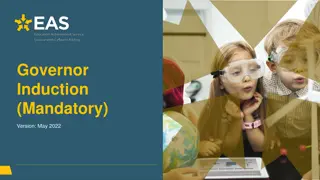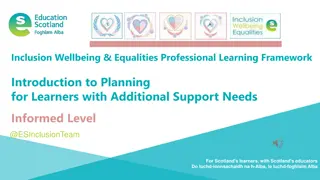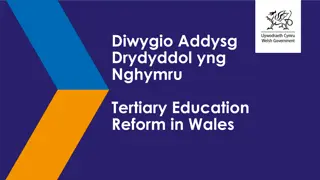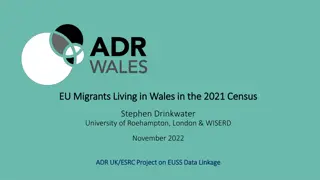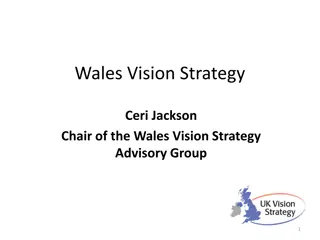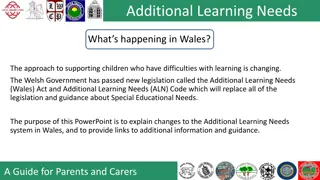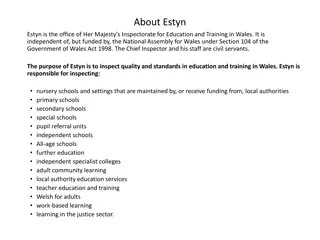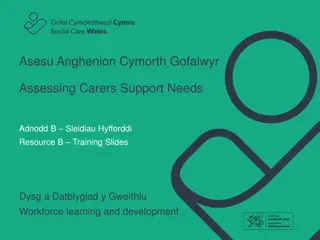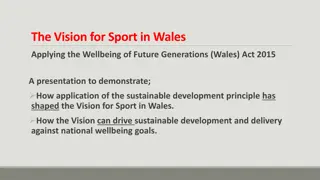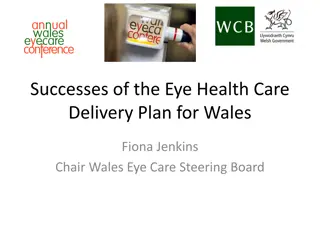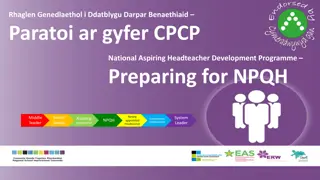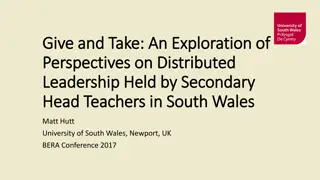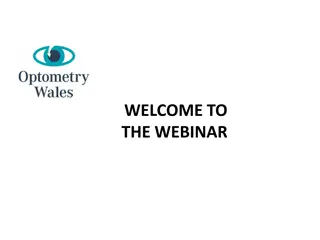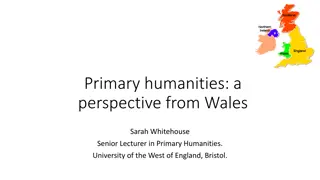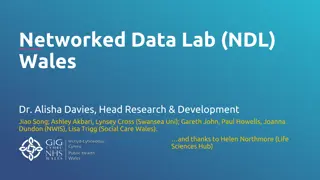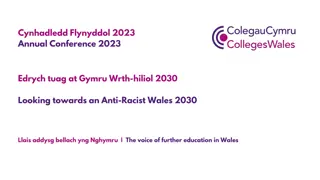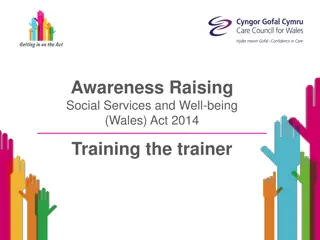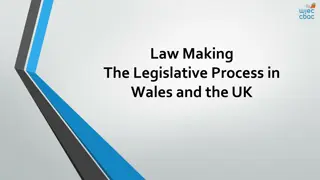Changes in Additional Learning Needs Support in Wales
The Welsh Government has introduced new legislation known as the Additional Learning Needs (Wales) Act and ALN Code to replace existing legislation on Special Educational Needs. The new system extends support for children and young people aged 0-25, introduces a unified plan called the Individual Development Plan, emphasizes collaboration among services, and focuses on achieving positive outcomes while providing clear rights of appeal. These changes aim to simplify the process, involve children and their views in decision-making, and enhance the support for those with additional learning needs in Wales.
Download Presentation

Please find below an Image/Link to download the presentation.
The content on the website is provided AS IS for your information and personal use only. It may not be sold, licensed, or shared on other websites without obtaining consent from the author.If you encounter any issues during the download, it is possible that the publisher has removed the file from their server.
You are allowed to download the files provided on this website for personal or commercial use, subject to the condition that they are used lawfully. All files are the property of their respective owners.
The content on the website is provided AS IS for your information and personal use only. It may not be sold, licensed, or shared on other websites without obtaining consent from the author.
E N D
Presentation Transcript
Additional Learning Needs What s happening in Wales? The approach to supporting children who have difficulties with learning is changing. The Welsh Government has passed new legislation called the Additional Learning Needs (Wales) Act and Additional Learning Needs (ALN) Code which will replace all of the legislation and guidance about Special Educational Needs. The purpose of this PowerPoint is to explain changes to the Additional Learning Needs system in Wales, and to provide links to additional information and guidance. A Guide for Parents and Carers
Additional Learning Needs What is happening and why? What is happening and why? The term Special Educational Needs (SEN) has been replaced by Additional Learning Needs (ALN). This short video will explain some of the main changes. A Guide for Parents and Carers
Additional Learning Needs The New Act will . . . . Introduce of the term Additional Learning Needs (ALN) ALN replaces the terms 'Special Educational Needs' (SEN) and 'Learning Difficulties and/or Disabilities (LDD) Extend the age group to 0-25 The new system will support children and young people from 0-25. Create a unified plan The Act will create a single statutory plan (the individual development plan (IDP)) to replace the existing variety of statutory and non-statutory SEN or LDD plans for learners in schools and further education, such as statements and IEPs Have increased participation of children and young people The Act requires that learners views should always be considered as part of the planning process, along with those of their parents. It is imperative that children and young people see the planning process as something which is done with them rather than to them. A Guide for Parents and Carers
Additional Learning Needs The New Act will . . . . Have high aspirations and improved outcomes, with a simpler system The emphasis of IDPs will be on making provision that delivers real outcomes that contribute in a meaningful way to the child or young person s achievement. The process of producing and revising an IDP should also be much simpler than is currently the case with statements of SEN. Have increased collaboration The new system encourages services to work together collaboratively and flexibly in order to ensure information sharing between agencies. which is essential to ensuring that needs are identified early, and the right support is put in place to enable children and young people to achieve positive outcomes. Avoid disagreements and earlier disagreement resolution, with clear and consistent rights of appeal The new system will focus on ensuring that where disagreements occur about an IDP or the provision it contains, the matter is considered and resolved at the most local level possible. However, where disagreements about the contents of an IDP cannot be resolved at the local level, the Act ensures that children and young people entitled to an IDP (and their parents/carers in the case of those that are under 16 years) have a right of appeal to a tribunal. A Guide for Parents and Carers
Additional Learning Needs The New Act will . . . . Be the ALN code The Code will ensure that the new ALN system has a set of clear, legally enforceable parameters within which local authorities and those other organisations responsible for the delivery of services for children and young people with ALN, must act. Be a bilingual system Services will be required to consider whether the child or young person needs ALP in Welsh. If they do, this must be documented in the IDP and all reasonable steps must be taken to secure the provision in Welsh. A Guide for Parents and Carers
Additional Learning Needs What is ALN? What is ALN? This is a short video explaining what additional learning needs are and how to get the right support for your child. A Guide for Parents and Carers
Additional Learning Needs Planning and Reviews Planning and Reviews Person Centred Practise Person Centred Practise Select a button for more information One Page Profiles One Page Profiles Individual Development Plans Individual Development Plans Meetings and Who Attends Meetings and Who Attends A Guide for Parents and Carers
Additional Learning Needs Person Centred Practise Using person-centred thinking tools can improve communication between children, families and practitioners and adopting person-centred approaches can be particularly useful when thinking and planning for transition between schools. All maintained schools within the local authority will aim to communicate with your child and you using person-centred practise communication tools. This includes working with you and your child to complete a One Page Profile (OPP). The Welsh Government have created resources for families, children and young people on what to expect at PCP meetings and annual reviews. These resources can be found on https://gov.wales/person-centred- reviews-guidance-families A video and further guidance on person-centred reviews can be accessed on https://www.youtube.com/watch?v=bkwBSF0nxiY Back to Planning and Reviews Back to Planning and Reviews A Guide for Parents and Carers
Additional Learning Needs One Page Profiles With the implementation of the ALN Act, those working with children and young people will be using One Page Profiles (OPP) to gather relevant information. The OPP captures all the important things about the child or young person on a single sheet of paper under three simple headings: What people appreciate about me? What s important to me at school? How best to support me at school? Back to Planning and Reviews Back to Planning and Reviews A Guide for Parents and Carers
Additional Learning Needs Individual Development Plans An IDP is a legal document that will replace statements, Individual Education Plans (IEPs) and Learning Support Plans. An IDP focuses on what your child needs for them to reach their educational potential. The information noted on the IDP will be used to inform the Additional Learning Provision (ALP). The type of support outlined, and the detail within the plan, will depend on the extent of your child's ALN. Any child or young person (0-16) who fits the description of ALN will need an IDP. A request for an IDP can be made by a parent/carer, professional, or the learner themselves. For school-aged children, the request is made to school first. The Additional Learning Co-ordinator (ALNCO) will probably be your main point of contact. The school will hold responsibility for the IDP. An IDP will be reviewed annually (within 12 months) following the person-centred review model (explained in the previous slide). A child s IDP can be either maintained by a school or the Local Authority. Back to Planning and Reviews Back to Planning and Reviews A Guide for Parents and Carers
Additional Learning Needs Meetings and Who Attends ALNCO- Additional Needs Co-ordinator The role of the ALNCO is similar to SENCO . The ALNCO is the lead for all Additional Needs in school. They work in maintained schools , nurseries and PRUs. EYALNCO Early Years Additional Needs Co -Ordinator works with parents , early years settings ,health settings and others who work may be working with children below compulsory school age. To promote early intervention. Designated Educational Clinical Lead-The new law requires all health boards to have a designated Educational Clinical Lead. They will be responsible for co ordinating the health board's role in relation to the young person and ALN. Continue with PowerPoint Back to Planning and Reviews Continue with PowerPoint Back to Planning and Reviews A Guide for Parents and Carers
Additional Learning Needs Universal Learning Provision (ULP) If you child does not have an Additional Learning Need under the new ALN Code for Wales, but does need some targeted support in school, they will receive Universal Learning Provision. This may include support interventions such as Catch Up, Nessy, Word Shark, Number Shark etc. This provision may be provided to small groups and/or individuals. If you are used to your child receiving an IEP (Individual Education Plan) this may now be replaced by a ULPP (Universal Learning Provision Plan). A Guide for Parents and Carers
Additional Learning Needs This is the online ALN platform developed by Powys County Council. For more information on Tyfu, contact your school s ALNCO. A Guide for Parents and Carers
Additional Learning Needs Working Together The new ALN Act involves greater collaboration between you as parents/ carers, your child, and the professionals supporting your child. Children and their parents/carers have the opportunity to participate in decision-making, to ask questions, and voice concerns along the way. The new ALN Act has led to a simpler, less adversarial system. However, if disagreements do occur, families may ask the Local Authority to review and reconsider decisions. A Guide for Parents and Carers
Additional Learning Needs Glossary ALN Additional Learning Needs (previously referred to as Special Educational Needs or SEN): ALN Code of Practice: a guide for parents, schools and Local Authorities about the help they can give to children with Additional Learning Needs. ALP (Additional Learning Provision): the provision or support described in the person's IDP Annual Review: The review of an IDP completed by the Local Authority within 12 months of creating an IDP, and then on an annual basis. IDP (Individual Development Plan): the plan created for each child or young person with ALN. These replace IEPs (Individual Education Plans) LA (Local Authority): County Council Learning difficulties: A child has learning difficulties if they find learning significantly harder than most other children of the same age. LSA (Learning Support Assistant)/ TA (Teaching Assistant): a person employed in school to support children's learning under the direction of a class teacher. PCP (Person Centred Practice): Discussions between all interested parties which results in a OPP (One Page Profile): A document which highlights a child s view, what s important to them and how they want to be supported. PIP (Pupil Inclusion Panel): This is the Local Authority panel to whom ALN referrals are made, when school is seeking further advice and support. ULP (Universal Learning Provision): targeted learning support provided by school for all pupils, as and when needed. A Guide for Parents and Carers
